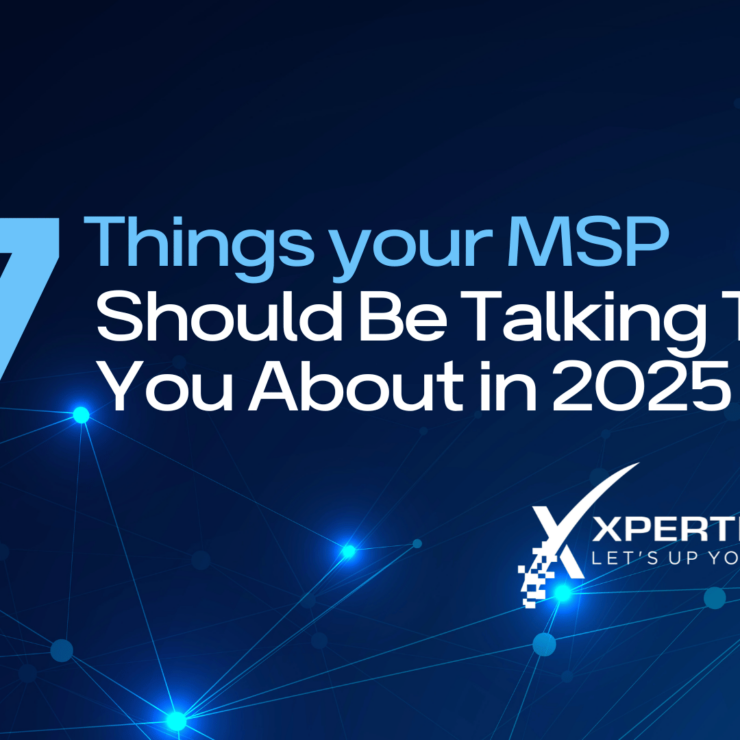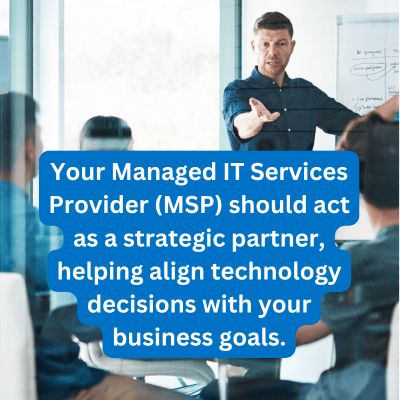7 Things Your MSP Should Be Talking to You About in 2025

In 2025, staying competitive means ensuring your IT strategy keeps pace with rapid technological changes. From major software deadlines to the rise of AI, IT decisions directly affect your operations and budget. Your Managed IT Services Provider (MSP) should act as a strategic partner, helping align technology decisions with your business goals. Here are seven critical topics your MSP should be discussing with you to drive your IT strategy forward.
Table of Contents
Key IT Priorities for SMBs in 2025
1. Windows 10 End of Life

Microsoft is ending support for Windows 10 in October 2025, which means security updates and patches will no longer be available. If your MSP hasn’t started this conversation yet, now is the time.
Upgrading to Windows 11 is an opportunity to evaluate your hardware and ensure your systems meet modern requirements. Older machines may not meet the standards for Windows 11, so this is a good time to review your inventory and plan a hardware refresh.
Why does this matter? Replacing old devices keeps your systems compatible with modern software, reduces security risks, and gives your team a performance boost. It’s also a significant budget consideration. Your MSP should help you plan ahead so you can tackle this transition smoothly.
Related: Proactive Planning for Windows 10 End of Life
2. Microsoft Copilot
AI is no longer a future concept—it’s here, and Microsoft Copilot serves as an AI assistant, handling everyday tasks so your team can focus on more strategic initiatives. Your MSP should be guiding you on how to strategically integrate Copilot into your workflows to enhance productivity and save valuable time.
Copilot is designed to assist with tasks your team handles every day, such as creating documents, summarizing content, and analyzing data. By automating repetitive processes and streamlining workflows, Copilot allows your people to focus on higher-value work that drives your business forward.
Your MSP should help you understand how Copilot fits into your IT strategy and budget. It’s important to note that Copilot is an additional cost on top of Microsoft 365 licensing. Your MSP can guide you in evaluating which roles in your organization will benefit the most from this tool and how to maximize its value while staying within budget.
3. Business Process Automation
Business process automation helps SMBs address common challenges liketime-consuming manual tasks and inconsistent processes. For example, automation can streamline customer invoicing, optimize inventory tracking, or simplify compliance reporting, saving time and reducing errors. By freeing employees from repetitive work, automation not only prevents burnout but also preserves institutional knowledge, ensuring your team can focus on high-value activities.
Your MSP should guide you through implementing automation where it can have the greatest strategic impact. By leveraging tools like Microsoft Power Platform and other low-code technologies, they can help you automate repetitive tasks, integrate systems, and improve visibility across operations. Beyond saving time, automation strengthens your ability to adapt to change, meet compliance requirements, and position your organization for growth.
Ultimately, automation reduces costs, improves operational agility, and enhances customer experiences, all while ensuring your IT strategy supports measurable business outcomes.
Related: How to Find Opportunities for Business Process Automation
4. Advanced Cybersecurity Strategies
Cyber threats are evolving fast, and your cybersecurity strategy must keep up. AI-driven attacks, sophisticated phishing schemes, and new vulnerabilities demand more than basic security tools—they require a proactive and layered approach.
Your MSP should be helping you build a comprehensive security strategy for 2025. This includes implementing 24/7 threat monitoring, using advanced tools to detect threats in real time, and preparing for rapid incident response.
A strong security strategy combines technology, processes, and expertise to stay ahead of the latest threats. If your MSP isn’t guiding these conversations, your business could exposed to unnecessary risk.
5. Business Applications
The software your team uses daily directly impacts your efficiency and ability to grow. Outdated applications not only slow operations but also frustrate employees and affect your bottom line. Your MSP should regularly evaluate whether these tools meet your business needs, integrate seamlessly with other systems, and scale to support growth.
Your MSP can bring valuable insights into how to optimize applications to maximize their impact. This includes identifying opportunities to leverage AI, streamlining workflows, and ensuring that your software aligns with your overall IT strategy. By keeping applications up to date and relevant, your business can reduce inefficiencies, enhance employee satisfaction, and achieve better results.
6. Annual Vendor Review
Vendor relationships are a critical part of your IT strategy. Your MSP should ensure vendors align with your objectives, security standards, and technology needs. This involves analyzing performance, uncovering redundancies, and addressing security concerns like network access compliance. Vendor reviews ensure your IT ecosystem remains efficient and cost-effective.
Vendor relationships are equally critical to your IT strategy. Your MSP should assess whether your vendors align with your business objectives, security standards, and evolving technology needs. This includes analyzing vendor performance, identifying gaps in service, and uncovering redundancies or overlaps in tools.
Security is a vital part of these assessments. Your MSP should evaluate how vendors access your network and whether they comply with your security policies. By addressing both applications and vendors together, your MSP ensures your IT investments deliver maximum value and strengthen your business’s overall IT ecosystem.
Related: Your Vendors Are Responsible for Your Security
7. IT and Security Policies
Proactive policy management is crucial for SMBs to ensure their IT and security measures support business goals while mitigating risks. Many businesses overlook the importance of clear, updated policies until an issue arises—but by then, the damage may already be done.
Your MSP should help you identify gaps in your current policies and guide you in creating or updating them to address evolving technologies like AI, as well as changes in compliance requirements. For example, do you have a policy outlining how AI tools like Microsoft Copilot should be used responsibly? Are your security processes documented and actively enforced to prevent vulnerabilities?
Well-documented policies do more than check a compliance box. They ensure consistency across teams, reduce the risk of costly errors, and provide a framework for responding to emerging threats. Your MSP’s expertise can help you make policy management a strategic advantage, not an afterthought, aligning your technology with your long-term business objectives.
Is Your MSP Having the Right Conversations?
Your MSP should be more than just your IT support provider. They should be a strategic partner, helping you plan for the future and navigate today’s IT challenges. If your current provider isn’t bringing these topics to the table, it might be time to ask yourself: Are you getting the strategic guidance you need?
At XPERTECHS, every client receives vCIO services as part of our XperCARE Managed IT Services. We’re here to help you make informed IT decisions, stay ahead of technology changes, and ensure your systems support your business goals.
Ready to talk about what’s next for your IT strategy? Contact us for a free consultation.
